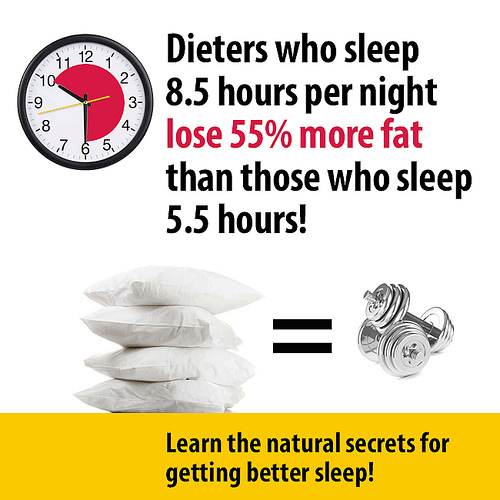Could your lack of sleep be causing weight gain, or an inability to lose body fat?
Even if you’re doing everything right—eating a healthful diet and getting adequate exercise—you could be missing out on a very important key to weight loss: your sleep!
If you aren’t sleeping enough, you could very well be sabotaging your weight loss efforts due to biological factors dependent on a good night’s rest, night after night. The secret to shedding those last few pounds? Sleep it off! Really.
{Suffering from insomnia? Get The Sleep Solution for 50% off!}
First, I want to let you know that this month only, you can get your hands on my latest ebook, The Sleep Solution: End Your Insomnia Naturally, for 50% off! Click here to check it out.
Lack of Sleep Screws Up Your Weight Hormones
There are two very important hormones which play a major role in regulating your bodyweight—ghrelin and leptin.
Your body is actually programmed with built-in “stop” and “go” signals when it comes to determining how much you should be eating, and when you should stop, in the form of a couple specific hormones. They do a great job of regulating your food intake—and thus, your weight—unless you’re not sleeping enough.
Ghrelin’s job is to signal hunger and stimulate your appetite—it’s the “green light” for you to eat, and keep eating. As you can imagine, this isn’t a hormone you want in excess if you’re trying to lose weight—the last thing you need is for your body to tell you to keep eating beyond what you truly need. Ghrelin also plays a role in fat retention—it increases glucose production and reduces the number of calories you burn.
Leptin is the “red light” of this process. It’s the hormone of satiety, which signals your body to stop eating when you’ve had enough food. So, if you don’t have enough leptin, you’ll continue feeling hungry, and are likely to overeat. Leptin’s levels naturally run high at night, so that you won’t feel hungry while you’re sleeping, then drop during the day to allow your body to take in the energy in needs. Leptin will rise as needed to keep hunger at bay.
But with sleep deprivation, this delicate balance fails. If you’re not getting enough sleep, your levels of ghrelin (the “green light” hunger hormone) run high during the day, while leptin (the “red light” satiety hormone) falls too low. The result? An overstimulated appetite that you can’t seem to satisfy, eating more than your body actually needs, and weight gain (or the inability to lose).
One study found that people who slept only four hours per night for just two nights experienced an 18% reduction in leptin, and a 28% increase in ghrelin. The researchers theorized that sleep deprivation explains why some dieters hold onto body fat much more than others, even in the context of a caloric deficit, because ghrelin also promotes the retention of body fat.
Sleepless Nights = Slowed Metabolism
In one particular study, researchers tested participants who slept for 12 hours a night one night, but allowed them no sleep the next, and then had them eat a huge buffet breakfast the following morning. The subjects’ energy expenditure—or the calories the body burns—was generally 5% less than it was when they had a full night of sleep. Their post-meal energy expenditure was 20% less—meaning they were 20% less able to burn the calories they ate.
This is all because the metabolism is extremely dependent upon sleep—get a healthy amount of sleep on a regular basis, and your metabolism burns at a healthy rate to support your body’s systems as a whole, as well as regulate your weight. But if you don’t get enough sleep, that foundation crumbles. Your body requires a significant portion of its 24-hour cycle to maintain a state of rest, in order to support functions down at the cellular level—and that’s exactly what your metabolism supports.
Think you’re stuck at your current weight? You may just need more sleep
The critical roles that specific hormones play in weight loss, and how they are affected by sleep loss, has led to a major revelation now that the connection between the two has been understood.
Combined with the effects of a lowered metabolic rate, this would explain why those who are trying to lose weight have a much more difficult time doing so when they don’t sleep enough. Another study showed that dieters who slept 8.5 hours per night lost 55% more body fat than those who only got 5.5 hours.
In another study of people who were trying to lose weight, those who slept 6-8 hours per night lost an average of 10 more pounds than those who slept less. People who habitually sleep less than 6 hours per night are more likely to have a higher than average body mass index, while those who sleep 8 hours have the lowest BMI.
Clearly, if you’ve been unable to shed extra pounds, and you haven’t been sleeping enough—that’s a problem you need to address. It’s not your fault your body’s holding onto your weight—it’s the fact that you need more sleep!
 Want to learn how to solve your sleep problems?
Want to learn how to solve your sleep problems?
If you want to learn the secrets to getting better sleep, and end your insomnia for good like I did, my latest book, The Sleep Solution, is for you. It’s already helped hundreds of sleep-sufferers finally get the rest they need, and right now, it’s 50% off!
Click here to learn more and save 50%.






This is timely for me… Struggling with the last, unbudging 10 pounds of baby weight, which could be a breastfeeding thing but might also be sleep. My kid is an amazing sleeper, always has been, but I haven’t shifted my night owl tendencies yet (and also need to work when he’s asleep). Prioritising this now… Bigtime…
It is really true that sleeping less will have an effect on your weight loss. I usually sleep around 5.5 hours and had very little success in losing weight. Have to increase it to 7 or 8 hours and see how I fare.